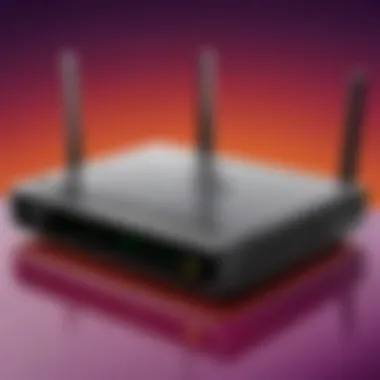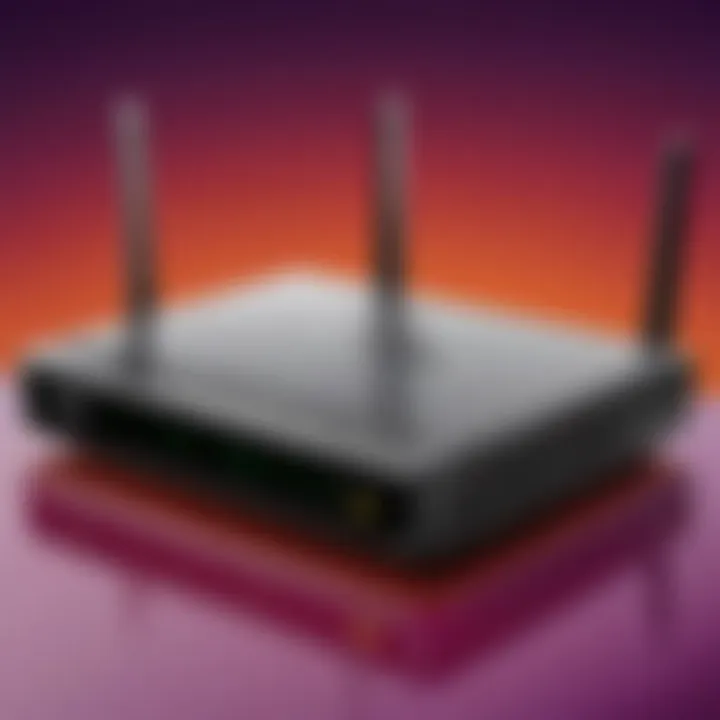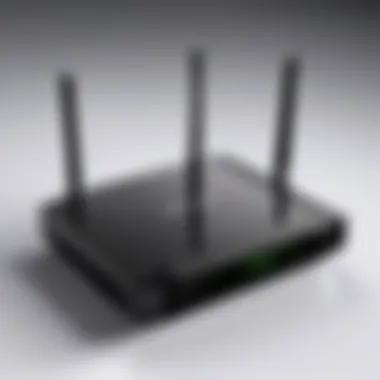Comprehensive Review of Netgear AC750 Router


Intro
The Netgear AC750 router is a device designed to cater to a broad spectrum of users, from casual internet surfers to dedicated gamers. This article explores the nuances of this router, focusing on its core features, performance metrics, and overall usability. In a landscape crowded with innumerable options, understanding what the AC750 brings to the table is essential for making an informed choice.
Product Overview
Brand Information
Netgear is a veteran in the networking industry, known for reliable and efficient devices. Established in 1996, the brand has built a strong reputation due to its focus on innovation and customer satisfaction. Netgear’s routers are designed to enhance home networking with a combination of speed, performance, and user-friendly functionalities.
Key Specifications
The Netgear AC750 router operates on both 2.4GHz and 5GHz frequencies, offering a dual-band capability that is appealing to various users. Key specifications include:
- Maximum speed: 750 Mbps
- Ports: 1 WAN port and 4 LAN ports
- Wi-Fi standard: 802.11ac
- Security protocols: WPA2, WPA
Pricing
As of October 2023, the Netgear AC750 is priced competitively, making it an attractive option for budget-conscious consumers. The typical retail price hovers around $50, although prices can vary by retailer.
Performance Comparison
Benchmark Tests
When it comes to performance, benchmarks reveal that the AC750 stands its ground well among similarly priced routers. Speed tests show that it can handle multiple devices streaming HD content without significant slowdown.
Speed and Efficiency Comparisons
In comparative studies, the Netgear AC750 consistently ranks well against competitors such as the TP-Link Archer A6 and the Linksys EA6350. While slightly slower under heavy load, it often excels in user-friendly setup and reliability.
Features and Technology
Unique Features
One of the more notable features of the AC750 is its setup simplicity. With the Nighthawk app, users can configure their routers easily without requiring advanced technical knowledge. This is particularly beneficial for less experienced individuals.
Technological Advancements
The incorporation of advanced security protocols such as WPA2 ensures that user data remains secure while using public networks. This is increasingly important in a tech environment where cyber threats are omnipresent.
Compatibility with Other Devices
The AC750 is compatible with most devices, including smart TVs, gaming consoles, and smartphones. This wide compatibility enhances its usability in diverse environments.
Pros and Cons
Strengths of the Product
- Affordable price
- Dual-band capability
- Easy setup
Areas for Improvement
- Limited range compared to higher-end models
- Performance may dip under excessive load
Value for Money
Cost-Effectiveness
Given its price point, the AC750 offers considerable value, particularly for smaller household setups where high-speed connections are not paramount.
Long-Term Benefits
Investing in the AC750 can yield significant benefits, especially for users who require basic functionality without sophisticated features.
Comparison with Similar Products
Comparatively, the AC750 provides solid performance but may fall short when pitted against routers with more advanced specifications and higher price points. Users need to assess whether they can leverage such enhancements in their individual scenarios.
"Assess your own needs: the best router is one that fits your specific internet usage habits."
In summary, the Netgear AC750 router presents a robust option for users seeking basic functionality, a reliable connection, and ease of use in their home networks.
Preface to the Netgear AC750
The Netgear AC750 router stands as a pivotal device in today’s broadband landscape. The rapidly increasing demand for speed and connectivity necessitates high-quality routers, and the AC750 addresses various user needs. Understanding why this router garners attention becomes crucial for discerning buyers.
Understanding the Need for High-Speed Routers
Modern living revolves around seamless internet connectivity. High-speed routers facilitate streaming, gaming, and telecommuting, enhancing user experiences. A router like the Netgear AC750 offers dual-band functionality, which means it can operate on both 2.4 GHz and 5 GHz frequencies. This creates better bandwidth management and minimizes interference from other devices. The enhancement in performance addresses common frustrations, such as lagging or buffering, often encountered in tech-heavy households.
High-speed routers are not merely convenience tools; they have become necessities. As smart devices proliferate and households grow more technology-dependent, reliable internet service stands at the forefront. Having a router that can support multiple devices simultaneously is a substantial advantage.
Overview of Netgear as a Brand
Netgear is a well-established name in the networking world, with a history that reflects innovation and quality. Founded in 1996, the brand has consistently released products that cater to both home and business environments, positioning them as leaders in the industry. The reputation of Netgear is built on reliability, ease of use, and effective customer support.
Netgear’s commitment to customer satisfaction is evident in the extensive range of products they provide. From entry-level models to advanced systems, they ensure that users can find an appropriate solution for their needs. This variety solidifies Netgear's status as a go-to option for many consumers. Its focus on technology advancements is a defining characteristic, offering products that integrate seamlessly with existing systems and future technologies.


Understanding the significance of choosing a reputable brand aligns with making informed tech purchases. Thus, the Netgear AC750 router not only presents technical prowess but also represents a brand that stands behind its products.
Technical Specifications of the Netgear AC750
Understanding the technical specifications of the Netgear AC750 router is crucial for discerning its performance and suitability for various internet applications. The router's specifications dictate its capabilities in terms of speed, connectivity, and overall reliability. In an era where wireless internet plays a pivotal role in both professional and personal settings, knowing the exact specifications helps consumers make informed decisions. Key elements to analyze in this section include supported wireless standards, speed and bandwidth, as well as connectivity options.
Wireless Standards Supported
The Netgear AC750 router supports several wireless standards, specifically IEEE 802.11ac, 802.11n, and 802.11b/g. This compatibility allows the device to cater to a wide range of devices in various networking environments. The 802.11ac standard, in particular, offers significant improvements in bandwidth and coverage over older standards. This means that users with compatible devices can experience faster data rates and more reliable connections.
- 802.11ac: This is the latest standard, allowing for higher throughput and wider coverage.
- 802.11n: Provides decent performance and is widely compatible.
- 802.11b/g: Supports older devices but offers lower speed and range.
By supporting these standards, the AC750 caters to both legacy devices and newer technology, making it versatile for different user needs.
Speed and Bandwidth Capabilities
When discussing the Netgear AC750, excitement often centers around its speed and bandwidth capabilities. The router is designed to deliver a combined wireless speed of up to 750 Mbps. This total includes up to 300 Mbps on the 2.4 GHz band and up to 433 Mbps on the 5 GHz band. Such specifications are especially appealing for streaming, online gaming, and videoconferencing, where stable and fast internet is essential.
Speed and bandwidth are vital considerations for anyone looking to use the router for specialized activities. High-speed connectivity helps prevent lag during gaming sessions. Additionally, it provides smooth, buffer-free streaming of high-definition content. Hence, users can optimize their internet setups according to their unique needs:
- For gaming: Prioritize 5 GHz for reduced latency.
- For streaming: Utilize dual-band capabilities for optimal performance.
Ports and Connectivity Options
Connectivity options enhance the overall user experience of the Netgear AC750. The router features two Ethernet ports for wired connections, offering stability and speed not always present in wireless connections. This ensures that home office setups or gaming consoles can remain reliable under heavy usage conditions.
In terms of additional connectivity, the AC750 also includes a USB port, allowing users to share storage devices or printers over the network. Here are the primary connectivity features:
- Two Ethernet ports: Facilitate wired connections for optimal performance.
- One USB port: Enables sharing of files and printers.
Overall, the combination of these technical specifications positions the Netgear AC750 as a competitive choice in the mid-range router market, balancing price and performance effectively.
Setup and Configuration Process
Setting up and configuring the Netgear AC750 router plays a crucial role in ensuring that users can fully utilize its features and capabilities. Proper setup can lead to optimal performance, reliable connectivity, and an overall enhanced user experience. In this section, we will cover the essential steps to take when setting up the router, detailing how users can get the most out of their devices.
Unboxing and Physical Setup
Unboxing the Netgear AC750 is the first step in the setup process. When you open the box, you will find the router itself, a power adapter, an Ethernet cable, and some documentation. The physical design of the router is compact, which allows it to fit in various spaces without occupying too much room.
When placing the router, it is essential to select a central location in your home. This positioning reduces interference from walls and physical objects, leading to better signal strength. Ensure that the router is elevated off the ground, preferably on a shelf or table, to improve range.
To physically connect the router, follow these steps:
- Plug the power adapter into the router and an electrical outlet.
- Connect the Ethernet cable from your modem to the WAN port on the router.
- If necessary, connect additional devices using Ethernet cables to the LAN ports.
Once these connections are made, you are ready to power on the router.
Accessing the Router Interface
After the physical setup is complete, the next step is to access the router interface. This interface is where users can configure various settings crucial for their network. To do this, you need a device with a web browser, like a smartphone, tablet, or computer.
Follow these steps to access the router interface:
- Connect to the router's Wi-Fi network using the default credentials found in the documentation or on a sticker on the router.
- Open a web browser and type in the router's IP address, typically (192.168.1.1) or (routerlogin.net).
- Enter the default login credentials. Usually, the username is "admin" and the password is "password" unless changed previously.
Entering this interface allows you to view various settings, including network configuration and security options.
Configuring Wireless Settings
Configuring the wireless settings is critical to ensuring a secure and efficient network. Once logged into the router's interface, users can customize Wi-Fi networks, security protocols, and more.
Here’s what to do:
- Navigate to the wireless settings section in the interface.
- Change the default network name (SSID) to something unique, making it easier to identify your network.
- Select a secure password to safeguard your connection. Using a strong password is crucial to prevent unauthorized access.
In addition to these settings, users should consider enabling security protocols such as WPA2 for their Wi-Fi networks. This protocol provides robust encryption for data transmission, making it difficult for unwanted users to access your system.
By taking the time to configure these settings, users establish a wireless network that maintains both functionality and security.
Remember, the configuration process can significantly impact the router's effectiveness in handling modern internet demands.
Performance Testing and Benchmarks
Performance testing and benchmarks are crucial when evaluating any router, including the Netgear AC750. This section aims to assess the router's capabilities in real-world conditions. By examining the performance under various scenarios, users can make informed decisions based on their specific needs. Understanding how a router performs provides valuable insights into its reliability, stability, and overall user experience.
Speed Tests in Different Conditions
Speed tests provide important data about the actual performance of a router like the Netgear AC750. Testing under different conditions, such as varying distances from the access point or interference from other devices, can show the router's ability to maintain high speeds.
In ideal conditions, where the device is close to the router, the AC750 can achieve significant speed levels close to its advertised maximum. However, as the distance increases, or when obstacles like walls come into play, the speed can diminish quite considerably. This highlights the importance of placement in optimizing performance.
A few key points to consider include:
- Distance: As distance increases, especially beyond 100 feet, the signal strength tends to weaken.
- Interference: Other electronic devices can hinder performance. Devices operating in the same frequency range, such as microwaves, can cause disruptions.
- Bandwidth Sharing: When multiple devices are connected simultaneously, each device shares the available bandwidth, which can lead to slower speeds if many users are active.
Range and Signal Quality Analysis
Range and signal quality are critical metrics in evaluating the Netgear AC750. Knowing how well the router performs in terms of coverage will be vital for users with larger homes or those needing a strong connection in multiple rooms.


The Netgear AC750 claims to cover a decent area, but actual performance can vary. Users should expect adequate coverage in small to medium homes. However, for larger spaces, signal repeaters or mesh systems might be necessary. Signals are often stronger in open spaces and tend to drop in rooms with thick walls.
Some factors affecting range and signal quality include:
- Physical Barriers: Walls, floors and furniture can impact signal strength.
- Router Positioning: Elevating the router and positioning it centrally can help.
- Environmental Factors: Things like fish tanks or large metal appliances can affect signal quality.
Performance Under Load
Understanding how the Netgear AC750 behaves under load is also essential. Many households use multiple devices simultaneously, whether for streaming, gaming, or general browsing. This section explores the router's performance when several devices are connected at the same time.
During testing, the AC750 showed promising results but had its limitations. In scenarios where up to 10 devices were simultaneously connected, some users reported slight lag during high-demand activities such as gaming and streaming. The router manages its bandwidth fairly well but struggled to maintain peak performance as more devices joined the network.
Considerations for performance under load include:
- Bandwidth Allocation: The router's ability to prioritize critical activities can affect performance.
- Connected Devices: A large number of devices can lead to bottlenecks, especially when streaming high-definition content.
- Quality of Service (QoS): Features like QoS can help optimize performance by prioritizing traffic for certain applications.
"A well-performing router not only supports browsing but also handles gaming and streaming effectively."
In summary, performance testing and benchmarks provide a comprehensive view of what users can expect from the Netgear AC750. Studies on speed, range, and performance under load inform potential users, helping identify whether this router meets their specific needs.
User Experience and Interface
User experience (UX) and interface design play crucial roles in the effectiveness of any router, including the Netgear AC750. A well-designed interface can make setup easier and ensure that users quickly access their desired settings. The availability of comprehensive features in an intuitive format can greatly enhance user satisfaction. Factors like ease of navigation, clarity of information, and accessibility of important tools can determine how effectively a router fulfills its intended purpose.
Navigating the Web Interface
Once the Netgear AC750 is physically set up, users will primarily rely on its web interface for configuration and monitoring. Accessing the web interface typically involves typing the router's default IP address into a browser. For the AC750, this is often \192.168.1.1 or \routerlogin.net. Users are required to enter login credentials, which are usually set to default values unless modified.
The layout of the web interface is fairly straightforward. Users can see options for network settings, parental controls, and device management clearly listed on the left sidebar. This organized arrangement simplifies access to various functionalities without overwhelming the user.
Key features include:
- Network Overview: Provides a snapshot of connected devices.
- Wireless Settings: Adjust SSID and password configurations.
- Security Options: Manage firewalls and VPN settings.
However, some users report a learning curve with advanced settings. For individuals unfamiliar with network terminology, it may seem daunting. Thus, comprehensive documentation is essential for maximizing the router's capabilities.
Mobile App Functionality
Alongside the traditional web interface, Netgear offers a mobile app called Nighthawk. This app complements the AC750, allowing users to manage their router directly from their smartphones. The Nighthawk app is particularly beneficial for those who prefer quick adjustments without logging into a PC.
Some advantages of the mobile app include:
- Remote Access: Control your settings from anywhere.
- Notifications and Alerts: Stay updated on network activity and security issues.
- Guest Network Setup: Easily create and manage a guest network.
This mobile approach is valuable for tech enthusiasts and casual users alike. By leveraging the app, users can make changes on-the-go and receive timely updates about their network health. The Nighthawk app thus makes the entire user experience more dynamic and responsive.
In summary, both the web interface and the mobile app functionality of the Netgear AC750 emphasize usability while offering robust tools to manage everyday network needs. Effective navigation in both formats enhances overall user satisfaction and optimizes the router's utility.
Comparative Analysis with Other Routers
In today’s rapidly evolving technology landscape, making informed decisions when selecting a router is critical. As users demand higher speeds and better connectivity for various applications, it becomes essential to understand how a specific model, such as the Netgear AC750, stacks up against its competitors. This comparative analysis not only helps consumers identify their options but also provides insights into what features genuinely matter for their needs and situations.
The significance of this section lies in dissecting the Netgear AC750 and comparing it with other prominent routers in the same segment. By focusing on factors like price, performance, and features, users gain an understanding of where the AC750 excels and where it falls short. Knowledge of these aspects allows for a more comprehensive view when making a purchasing decision.
Netgear AC750 vs. Competitors
When evaluating the Netgear AC750 against competitors, several models emerge, like the TP-Link Archer A6, Asus RT-AC66U, and Linksys EA6350. Each of these routers has its own set of strengths which can appeal to different user bases.
- Netgear AC750: Offers a balance of price and performance with a maximum speed of up to 750 Mbps suitable for moderate internet usage.
- TP-Link Archer A6: Typically provides a higher maximum speed of up to 1200 Mbps. Its configuration options allow for better customization.
- Asus RT-AC66U: Known for its advanced features, including better QoS (Quality of Service) settings. It is suitable for users who prioritize gaming and streaming.
- Linksys EA6350: Features a dual-band performance, offering a solid range and speed to accommodate multiple devices simultaneously.
In terms of price, the Netgear AC750 often sits at a more accessible point, which is appealing for budget-conscious consumers. However, it is necessary to consider whether the lower price point compromises critical capability.
Identifying Strengths and Weaknesses
Analyzing the strengths and weaknesses of the Netgear AC750 alongside its peers allows users to make educated decisions. Here are some of its notable strengths:
- Affordability: The AC750 is competitively priced, making it an attractive option for everyday users.
- Ease of Setup: Many reviewers highlight its straightforward setup process, which is friendly for those not well-versed in technology.
- Decent Range for Small Homes: The range is arguably satisfactory for smaller to medium-sized living spaces, facilitating Wi-Fi connectivity in standard settings.
However, it is crucial to be aware of its limitations, which include:
- Maximum Speed Restrictions: The 750 Mbps may not be sufficient for heavy use cases like extensive gaming or 4K streaming.
- Limited Advanced Features: Compared to other models, it lacks some advanced settings that tech-savvy users might find essential.
- Performance in Crowded Environment: Signal quality may deteriorate in a highly populated space with many connected devices.
"Choosing the right router involves understanding your specific requirements and how each model meets these needs."
Security Features
In today's digital landscape, security features in a router are crucial. The Netgear AC750, like its counterparts, must prioritize safeguarding data and maintaining a secure network environment. A router often serves as the first line of defense against various cyber threats. Understanding the types of security protocols available and how to manage these settings can significantly enhance user protection and overall network integrity.
Types of Security Protocols Available
The Netgear AC750 supports multiple security protocols to ensure a robust defense against unauthorized access. Here are the key ones:
- WPA2 (Wi-Fi Protected Access II): This is the most commonly used protocol today. It encrypts data to protect against eavesdropping, making it crucial for safeguarding privacy during online activities.
- WPA (Wi-Fi Protected Access): This is an earlier version but still provides decent security. It is less secure than WPA2, making it less favorable for modern use.
- WEP (Wired Equivalent Privacy): Though available, WEP is outdated and not recommended. Its vulnerabilities make it easy for attackers to bypass its security measures.
- Guest Network Feature: The AC750 allows creating a guest network, which keeps guest devices isolated from the main network. This feature is valuable for maintaining privacy and security.
Each protocol serves a distinct purpose, with WPA2 being the recommended choice for most users due to its strong encryption standards.
Managing Security Settings


Proper management of security settings is vital for ensuring that the Netgear AC750 remains secure. Here’s how to effectively handle these configurations:
- Access the Router Interface: Begin by logging into the router's web interface. This is usually done by entering the router’s IP address into a web browser.
- Navigate to Wireless Settings: Within the settings menu, locate the wireless settings. Here, users can select the desired security protocol.
- Set a Strong Password: Always opt for a complex password for the Wi-Fi network. Combine letters, numbers, and special characters to increase security.
- Enable Encryption: Select WPA2 as the encryption mode. This is critical for protecting wireless communications and data.
- Update Firmware Regularly: Keeping the router’s firmware up to date ensures that any security vulnerabilities are patched promptly. Regular updates provide enhancements that can better protect against new threats.
- Monitor Connected Devices: Regularly check the list of devices connected to your network. This can help identify any unauthorized access and take appropriate actions.
"Managing your security settings not only protects your network but also grants peace of mind as you navigate the digital space."
Effective management of security settings on the Netgear AC750 can greatly mitigate risks and ensure a safer online experience for all users. By following these steps, you can maintain a secure connection and protect sensitive data.
Common Issues and Troubleshooting
Addressing common issues and troubleshooting is vital when discussing the Netgear AC750 router. Understanding these challenges can help users maintain connectivity and ensure optimal performance. This section will explore two main concerns: connectivity problems and firmware updates.
Connectivity Problems
Connectivity issues can be a significant barrier to enjoying the full benefits of a router like the Netgear AC750. Users may experience problems such as dropped connections, sluggish speeds, or, in some cases, complete lack of access to the internet. Here are some common causes:
- Interference from neighboring Wi-Fi networks can lead to weak signals.
- Distance from the router can impact the strength and reliability of the connection.
- Device Limitations where older devices may not fully support the router’s capabilities.
- Physical obstacles like walls or furniture that can obstruct signals.
To troubleshoot connectivity issues, users can try the following steps:
- Re-boot the router by unplugging it for a minute and then plugging it back in.
- Ensure that the placement of the router is optimal, ideally in a central location.
- Check devices to make sure they are not exceeding the maximum connected count of the router.
- Change the Wi-Fi channel via the router settings to minimize interference.
"Regular maintenance and awareness of potential connectivity issues can drastically enhance your overall experience with network devices."
Firmware Updates
Keeping firmware up to date is crucial for the Netgear AC750's performance and security. Firmware updates often include improvements, new features, and crucial bug fixes that address known problems.
An outdated firmware version can lead to a range of issues, such as:
- Security vulnerabilities that expose the network to threats.
- Performance drops due to unresolved bugs or inefficiencies within the software.
- Compatibility issues with new devices that connect to the network.
To update the firmware:
- Log into the router interface, typically through a web browser using the default IP address (usually 192.168.1.1).
- Navigate to the firmware update section in the settings.
- Check for available updates and follow the prompts to apply them.
- Reboot the router if necessary.
Ensuring the firmware is current not only helps in troubleshooting but also enhances the device’s longevity and efficiency. Regular checks on the manufacturer’s website or within the router's interface can help users stay informed about available updates.
Use Cases and Applications
Understanding the use cases and applications of the Netgear AC750 router is crucial for potential buyers. This section emphasizes how well the device serves distinct needs, catering to various scenarios like streaming, gaming, and general home networking. By analyzing specific elements and benefits, we can recognize its versatility. For tech enthusiasts, gamers, and IT professionals, knowing the strengths of this router can significantly influence decision-making regarding broadband connectivity.
For Streaming and Gaming
The Netgear AC750 is particularly suitable for users who engage in streaming and gaming activities. It supports dual-band frequencies, which enables better connectivity for high-demand applications. For instance, while engaging in a multiplayer online game, a stable connection is vital for minimizing lag. The AC750’s bandwidth capabilities can handle multiple devices, ensuring that streaming services like Netflix or Amazon Prime Video run seamlessly, even while other family members are online.
A key advantage of using the Netgear AC750 is its ability to manage heavy traffic without compromising speed.
Moreover, the router’s wireless standards ensure compatibility with various devices and applications. For gamers, the AC750's QoS (Quality of Service) settings allow customization. Users can prioritize bandwidth for their gaming console, which may lead to improved responsiveness and gameplay performance.
Ideal for Home Networking
In addition to gaming, the Netgear AC750 also excels as a general home networking solution. Its capability to support multiple devices simultaneously makes it ideal for households with various gadgets. Many modern homes rely on smart devices, such as thermostats, lights, and security cameras. The AC750 handles these connections effortlessly.
When considering home networking, the ease of setup and configuration is of great importance. The Netgear AC750 simplifies this process. Users can quickly connect their devices without extensive technical knowledge. Moreover, its manageable interface appeals to non-technical users, making it an attractive option for families.
In summary, the Netgear AC750 stands out as a versatile router. Its ability to cater to both high-demand streaming and gaming scenarios, as well as general home networking needs, demonstrates its significance in today’s digital landscape. The combination of reliable performance and user-friendliness makes it a thoughtful choice for various applications.
Customer Support and Warranty
In the realm of technology, the importance of robust customer support and a clear warranty cannot be overstated. These elements serve as safety nets for users who invest in devices such as the Netgear AC750 router. Without them, users may face challenges that could detract from their overall experience. Having access to reliable assistance ensures that problems can be resolved quickly, while a solid warranty provides peace of mind regarding the durability of the product.
Accessing Technical Support
Accessing technical support with the Netgear AC750 is straightforward. One can reach out to Netgear through multiple channels:
- Official Website: The Netgear website contains a support section with a library of articles, FAQs, and troubleshooting guides.
- Phone Support: Direct phone support is available for immediate assistance from trained professionals.
- Community Forums: The Netgear community forums are a good place for users to share experiences, solutions, and tips. Here, one can find discussions on common issues and innovative workarounds shared by other users.
- Live Chat: For those who prefer quick responses, live chat options are also available on the Netgear site. This allows for real-time communication with customer service representatives.
Technical support is an essential aspect of customer satisfaction. According to a survey, 67% of customers say that a good support experience makes them more likely to stay loyal to a brand.
To ensure a smoother support experience, it helps to have your router's model number and a description of the issue ready before contacting support.
Understanding Warranty Terms
The warranty terms associated with the Netgear AC750 can significantly influence purchase decisions. Understanding these terms helps consumers know what kind of coverage they can expect:
- Length of Warranty: Netgear typically offers a limited warranty for one year from the date of purchase. This covers defects in materials and workmanship.
- Types of Coverage: The warranty includes repair or replacement of the defective product at no extra cost. However, it does not cover damages resulting from misuse, unauthorized repairs, or acts of nature.
- Registration: To maximize warranty benefits, customers are usually encouraged to register their product online. This facilitates quicker service when needed.
- Service Process: If a return is necessary, customers can follow a simple process outlined on the Netgear website to initiate it. This process includes packaging and shipping instructions to ensure the router is returned safely.
Overall, a clear understanding of customer support and warranty terms enhances a user’s confidence in their purchase, fostering a better relationship between the consumer and the brand. When users know that help is readily available and that their investment is protected, they can focus on enjoying the reliable performance of their Netgear AC750 router.
Closure
In the realm of home networking, selecting the right router is a crucial element of ensuring reliable connectivity. The Netgear AC750 router stands out due to its blend of performance and user-friendly features, catering to a range of needs, from casual browsing to gaming.
Final Thoughts on the Netgear AC750
The AC750 router presents several advantages. First, its dual-band capability allows users to connect multiple devices without significant slowdown. This is particularly useful for households with demanding internet users or smart devices. Speed benchmarks indicate that this router can handle streaming in HD and online gaming simultaneously, reducing lag for various applications.
On the security front, the AC750 comes equipped with essential protocols that safeguard your network. Regular firmware updates ensure that users benefit from the latest protection against vulnerabilities. Additionally, the intuitive web and mobile interface simplifies management tasks, even for those who may not be tech-savvy.
Nevertheless, prospective buyers should consider its limitations, such as range issues in larger homes where additional equipment may be needed. Furthermore, while its speed is commendable, it might not suffice for heavy users requiring ultra-high-definition streaming on multiple devices.
In summary, the Netgear AC750 router is a strong contender for individuals seeking a balance of functionality, security, and ease of use. Its strengths shine in moderately sized environments, making it an attractive choice, but understanding its boundaries can guide users toward making informed decisions about their specific needs.
"Choosing the right router can significantly enhance your internet experience. The Netgear AC750 is a solid option, particularly for everyday users."







